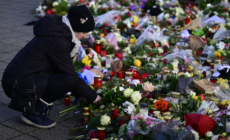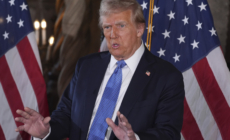-
‘SNL’ Takes on New Jersey Drones: ‘Dumb Theories’ - 29 mins ago
-
A Woman With a Rare Gene Mutation Fights to Avoid Her Mother’s Fate - 35 mins ago
-
Newsom and a fellow Democrat spar over constitutional convention on gun control - 37 mins ago
-
Germany Christmas Market Latest: Suspect Remanded in Custody - about 1 hour ago
-
Inside China’s intelligence operation in L.A. County - about 1 hour ago
-
What Nantucket Owes the Whale - about 1 hour ago
-
What stores are open on Christmas Day 2024? - 2 hours ago
-
Trump’s deportations on a collision course with California’s economy - 2 hours ago
-
U.S. Fighter Jet Shot Down Over Red Sea by Apparent Friendly Fire - 2 hours ago
-
Donald Trump Says US Could Demand Return of Panama Canal - 2 hours ago
Is It Time To Stop Insisting on U.S. Global Primacy? | Opinion
The time following the Cold War was what foreign policy wonks now, somewhat dolefully, refer to as the “unipolar moment.” The term, coined by columnist Charles Krauthammer, described an era in which the world was clearly led by a sole superpower: the United States of America.
With power came responsibility, as Spider-Man once said, but accompanying it was the particular challenge of overconfidence. Notably, influential thinkers like Robert Kagan and Bill Kristol successfully advocated for primacism (what’s usually called neocon foreign policy). Their logic was that the U.S. had to proactively assert its dominance, even if it meant intervention “when we cannot prove that a narrowly construed ‘vital interest’ of the United States is at stake.”
Fast forward to 2024 and we are all very familiar with the problems of being “the world’s police.” A man even ran for president railing against the primacists in 2016—and won. Still, although most academics recognize the end of an era, a remnant of primacism remains. Maybe more than a remnant, actually.
One place where it lingers is in our fixation on the concept of hegemony, voiced by the occasional primacist in “America First” clothing. Specifically, talks about remaining—and acting like—the world’s king (a lofty goal) are often equated with maintaining peace and advancing prosperity (the non-negotiables).
In Congress and think tanks, foreign policy conversations tend to focus on sending signals and projecting strength. Questions of concrete interests and our ability (or lack thereof) to sway certain affairs, as well as those regarding prioritization in a changing world order are, in effect, dismissed.
A recent open letter addressed to the next U.S. president, written by Singaporean academic Danny Quah, shines light on the issue the U.S. faces if it is unwilling to think beyond hegemony. In a very pragmatic fashion, Quah tells the next commander in chief that they should start worrying less about ruling the world and more about taking care of the American people.
When I first read the provocative piece, it inspired much rah-rah patriotism. When the conservative organization America 2100 shared a nostalgia-inducing video responding to the letter, showing that “America just isn’t really a second-place kind of country,” I mouthed “USA! USA! USA!” As when a Brit says “at least we don’t have school shootings,” it’s reasonable for Toby Keith to start playing in your head when non-Americans put our greatness in doubt.

Michael M. Santiago/Getty Images
Nonetheless, Quah’s letter, and the sentiments it portrays—which resemble those expressed by the likes of France’s Emmanuel Macron and Brazil’s Lula da Silva—shouldn’t be dismissed by American policymakers. First, because even while foreign voices may express criticism, their words shine light on existing domestic friction, as hegemonic considerations effectively shape U.S. policy in its entirety. The desire to remain number one and prioritizing the concrete interests of the American people, for instance, are goals that are sometimes in congruence, sometimes not.
Second, and more importantly, other country’s leaders’ opinions on U.S. leadership, especially in the context of competition with China, are worth taking seriously. They almost certainly reflect a view held by a growing number of Asians, Latin Americans, Africans, and even Europeans.
While it is easy to discard arguments like Quah’s and insist that those who call for thinking beyond hegemony are just Chinese assets, numerous surveys, diplomatic actions and military exercises indicate that, as Quah notes, a growing number of countries “want America in [their] world—just as [they] want China in it, too.”
The reality is that, in a world that has become increasingly transactional, aided by globalization, commercial interests reign supreme. Most countries see angering major world powers like China as bad policy, now more than ever before. Simply put, the primacist approach to world affairs is increasingly at odds with reality. The U.S. must deal with a world that is happy without American dominance, and must set priorities accordingly.
The views foreign scholars and leaders express about U.S.-China great-power competition must be met attentively, even if not all are equally instructive. I, for one, think that many, including Quah, oversimplify the real challenges China’s rise poses to the U.S. and underestimate the positive qualities of what Quah dismisses as “protectionist, anti-globalization forces.” Yet when the U.S. is described as “dysfunctional and insecure,” I listen—and so should Washington.
A world that views the U.S. as a problem-maker is a world the U.S. can’t lead. Arguably, obsessing over primacy has contributed most to the decline of U.S. influence. On the messy stage of national politics, we must not forget to deal with the world as it is. There’s a stereotype about Americans not knowing geography. Whether it’s true or not, what is for certain is that geography knows us.
Our times demand foreign policy stoicism—maintaining strategic humility, focusing on trying to change what can most easily be changed, and prioritizing the most concrete of threats. The U.S. should care less about hegemony not because we don’t want to lead, but because in obsessing over it, we act like primacists and stretch ourselves thin. In the end, if we don’t get rid of this remnant, if we don’t take prioritization seriously, we will be less safe—and less “hegemonic” for that matter. We can’t be the world police anymore, but we can, if we listen, continue to lead. Adaptation is virtue; changing nothing in a changing world is insanity.
Juan P. Villasmil is an Intercollegiate Studies Institute editorial fellow at The Spectator World.
The views expressed in this article are the writer’s own.
Source link




















